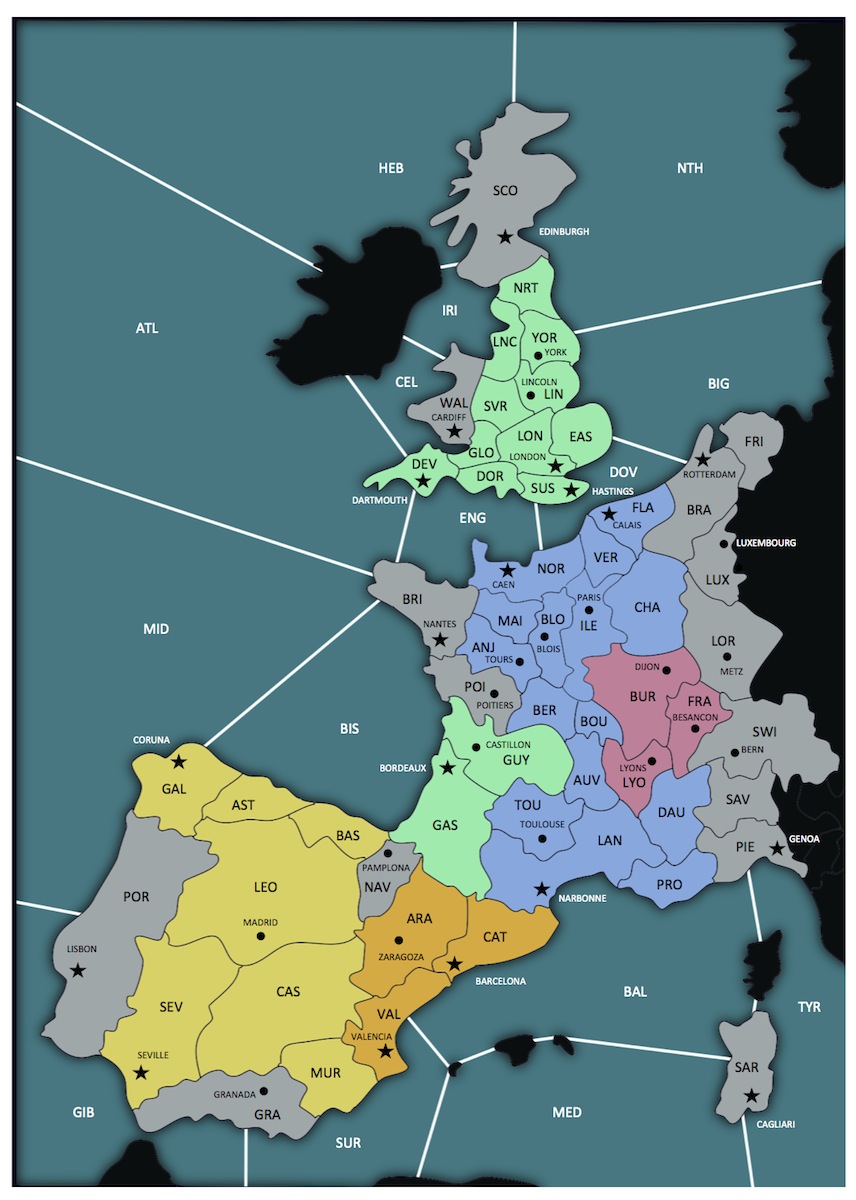Difference between revisions of "Western Europe 1300 (with Ports)"
| Line 4: | Line 4: | ||
(1) Rules of standard diplomacy apply with exception to the following: | (1) Rules of standard diplomacy apply with exception to the following: | ||
(2) Two types of supply centers appear in this variant: a standard in-land supply center (represented by a black dot on the map), and a port (represented by a black star). During the build phase, a fleet or an army can be placed in a port. | (2) Two types of supply centers appear in this variant: a standard in-land supply center (represented by a black dot on the map), and a port (represented by a black star). During the build phase, a fleet or an army can be placed in a port. | ||
| − | (3) Fleet rules: Unlike standard Diplomacy, fleets cannot move into and occupy a coastal province unless a port is present. For example F(BIS)->AST is not a legal move; F( | + | (3) Fleet rules: Unlike standard Diplomacy, fleets cannot move into and occupy a coastal province unless a port is present. For example F(BIS)->AST is not a legal move; F(SUR)->GRA is also not a legal move; however, F(BIS)->BRI is legal. As such, like in standard diplomacy, the fleet can only support another unit in a province (or unit moving to the province) if moving there is legal for the fleet. For example: F(DOV) supports A(FLA) to hold is legal, or F(DOV) supports A(VER)->FLA is legal; however, F(BIS) supports A(POI) to hold is not legal. |
(4) The standard map has been replaced by the Western Europe 1300 map (see below). Names of supply centers are included for flavor. | (4) The standard map has been replaced by the Western Europe 1300 map (see below). Names of supply centers are included for flavor. | ||
(5) Game begins in 1300 and progresses in the same manner as standard diplomacy. | (5) Game begins in 1300 and progresses in the same manner as standard diplomacy. | ||
Latest revision as of 15:30, 1 November 2012
Western Europe 1300 Diplomacy Variant (with Port rules) by Matthew Medeiros This variant is inspired by A. Schwarz’s Hundred. The map is loosely drawn from the geopolitical atmosphere of the late 13th century to early 14th century in Western Europe. Put simply, this is 5-player variant option to the Hundred game. The major powers are France, England, Castile, Aragon, and Burgundy. At the start there is an imbalance in the strengths of the powers (heavily skewed towards France and England), which hopefully will test diplomatic skills of the “minor” players (Castile, Aragon, Burgundy). As this is a new variant, commentary/feedback would be greatly appreciated in modifying and improving the flow of the game. Please email suggestions to medeiros412@aim.com. (1) Rules of standard diplomacy apply with exception to the following: (2) Two types of supply centers appear in this variant: a standard in-land supply center (represented by a black dot on the map), and a port (represented by a black star). During the build phase, a fleet or an army can be placed in a port. (3) Fleet rules: Unlike standard Diplomacy, fleets cannot move into and occupy a coastal province unless a port is present. For example F(BIS)->AST is not a legal move; F(SUR)->GRA is also not a legal move; however, F(BIS)->BRI is legal. As such, like in standard diplomacy, the fleet can only support another unit in a province (or unit moving to the province) if moving there is legal for the fleet. For example: F(DOV) supports A(FLA) to hold is legal, or F(DOV) supports A(VER)->FLA is legal; however, F(BIS) supports A(POI) to hold is not legal. (4) The standard map has been replaced by the Western Europe 1300 map (see below). Names of supply centers are included for flavor. (5) Game begins in 1300 and progresses in the same manner as standard diplomacy. (6) There are 36 supply centers on the board. Acquiring 19 centers is the condition for victory. No permanent home supply centers exist. A captured but owned and unoccupied supply center can serve as a build site. Neutral supply centers are indicated by grey regions. (7) Option: As this period in time is characterized by the conflict between France and England, it is highly encouraged that the English and French player begin as opponents, and that alliances are mainly formed with the “minor” players. (8) There are five powers with the following setup: FRANCE (BLUE): F(FLA), A(NOR), A(ILE), A(BLO), A(ANJ), A(POI), A(TOU), F(LAN); ENGLAND (GREEN): F(LON), F(SUS), F(DEV), A(GUY), F(GAS), A(YOR), A(LIN); ARAGON (BROWN): F(VAL), F(CAT), A(ARA); CASTILE (YELLOW): F(GAL), F(SEV), A(LEO); BURGUNDY: A(BUR), A(LYO), A(FRA)
